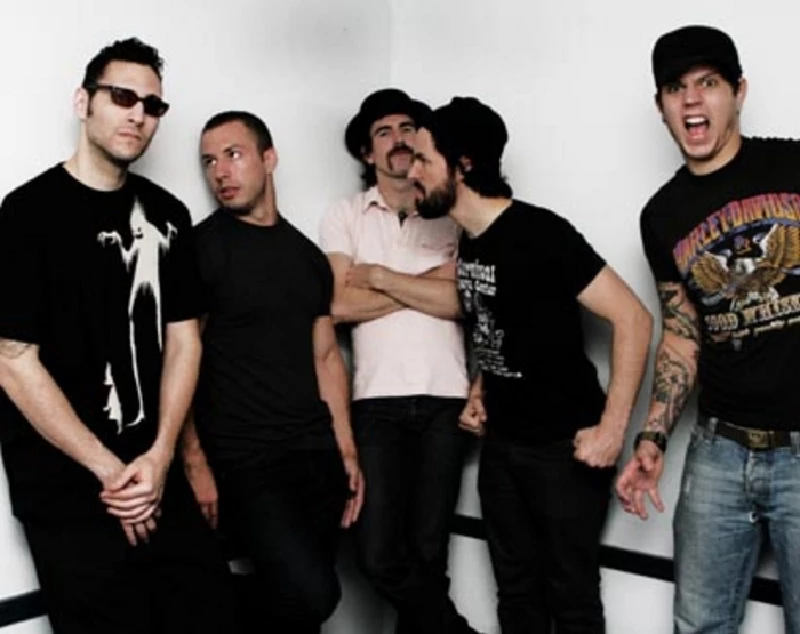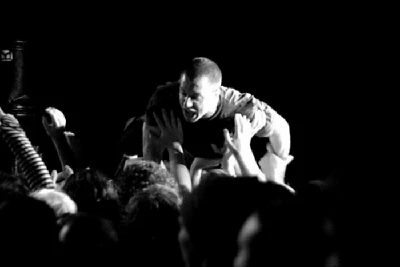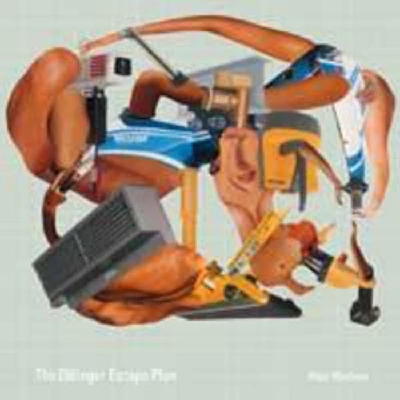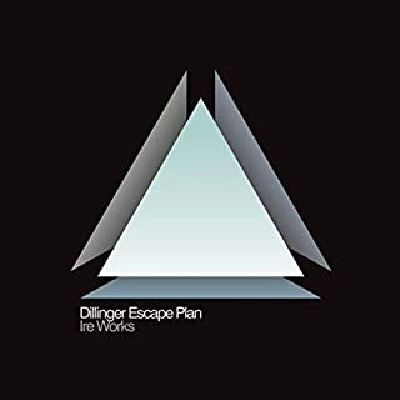Dillinger Escape Plan - Interview
by Paul Raven
published: 21 / 10 / 2007

intro
Having had to cancel their forthcoming European tour due to guitarist Ben Weinman breaking his foot, Paul Raven speaks to bassist Liam Wilson from hardcore outfit Dillinger Escape Plan about the recording of their new album @Ire Works' and working with Mike Patton
Few bands have the reputation for extreme, inventive and abstract rock music that Dillinger Escape Plan have slowly carved out for themselves. Likewise, few bands seem to run into quite the same amount of unavoidable physical misfortune. Dillinger Escape Plan have had to cancel their forthcoming tour due to guitarist Ben Weinman breaking his foot during a video shoot – merely the most recent medical mishap in a long chain. Perhaps unsurprisingly for a band who focus so closely on technicality and experimentation in their musical output, they're an intelligent and philosophical bunch of blokes. I had the opportunity to pester bass player Liam Wilson, and ask him about the recording of 'Ire Works' (their current long-player), working with Mike Patton ... and whether or not they're cursed by an omnipotent deity. PB : Where are you right at this moment, and what have you been up to in the last few days? LW : At the moment I’m sitting up in bed in a really sub-par hotel room in upstate New Jersey with Gil(Sharone, new drummer-Ed)and Jeff (Tuttle, guitar-Ed) sharing a bed next to me. We’ve been busy doing press during the days in NYC and rehearsals at night. Building hype and band morale. PB : How did the studio sessions for 'Ire Works' go? LW : Once we met Gil and heard the first half of his drums for the record, things started to roll. We had a few setbacks. Steve Evetts, our producer/engineer had to fly back to the East Coast to attend a funeral for a friend in the middle of recording – that’s just one example. Otherwise, the recording went very well, we’re all very proud of it and on an interpersonal level, being together that whole time, and really living the making of the record together brought us all much closer as friends more so than simply bandmates. PB : How much of a solid plan did you have before heading to the studio, if any at all? LW : We had 90% of it carved out before we left. There were a lot of open spaces that we had to fill in, and some things that we had sitting on the bench that we weren’t entirely sure if they were going to fit on the record. I guess we had a few plans, none of them too solid, but I think that’s the best way for us to work. Sometimes its hard to predict what everyone is going to do. Although we demoed everything thoroughly, we didn’t always exchange our personal trials and errors amongst each other, so there were a lot of surprises. We had most of the record worked out with programmed drums in case Gil wasn’t up to speed – there’s one example of a plan we had ready, but luckily didn’t have to execute. PB : Can you give us an insight into the song-writing process – where do your tunes start, and how are they developed? LW : Typically Ben comes up with the majority of the ideas. He sort of builds the framework and then Greg and I would come in and pick out the curtains, paint the walls. Since we don’t live very close, we would send files of ideas back and forth via email. When we got together to practice, we were all on the same page, we had our ideas relatively fleshed out and worked up to speed and could spend our time together working on the details and the ‘pocket’ of new material in real time instead of spending too much time working it up to speed as a unit. PB : Which are your personal favourites from your back catalogue – the two or three songs you're proudest of - and why? LW: Personally, I’d say ‘When Good Dogs Do Bad Things’(One of the songs on 2002 EP, 'Irony is a Dead Scene'-Ed) . Chronologically, it was the first song I was really excited to play on and really proud of when it was done. I was 21, the first big record my name was going to be on was with Mike Patton, and I found a place for a few little ideas I thought were pretty strong and that I’d been waiting to use in a song for a long time but could never find a place for in earlier bands. I think from a bass tone and performance stand-point, ‘We Are The Storm’ is one of the jewels in my crown so-to-speak. That was the last song we wrote and the last song I tracked on ‘Miss Machine’ (2004 album-Ed). Steve and I decided to tweak the tone a little bit. I was warmed up from the other songs and I thought it just came out sounding mean as all hell, but it still had this dreamy section that I think really foreshadows some of ‘Ire Works’. I think ‘Panasonic Youth’ (again from 'Miss Machine'-Ed)is another favorite. I think it’s a pissed off punk song that simply rips. I think it has got a little bit of everything we thought we were at that time. PB : If you could permanently erase one of your songs from history, which one would it be ? LW : That’s a slippery slope. Honestly, right now, I wouldn’t use that power unless I was absolutely forced to. PB : You've had to cancel your tour due to injury, which must be pretty frustrating. Do you like being out on the road playing live, or do you prefer being holed up in the studio making new material? LW: I like being holed up in the studio making new material so that I can get out on the road with new songs and a fresh gust of wind at our backs. PB : Tell us about your worst live show ever – what went wrong? LW : “Knitting Factory, Los Angeles ... probably sometime around February 2001. It just seemed like everything was going wrong. We had just flown into LA from Tokyo. We had a show booked and we had to play on Icarus Line’s gear. It was nightmarish, it was just bad ... that’s all I can say. PB : By way of contrast, what does it take to make the perfect Dillinger Escape Plan live show ? Do any band members have some bizarre pre-show rituals? LW : Nothing bizarre. We just do the usual stuff, stretching, maybe we’ll down a vitamin supplement in water ? Fixing our hair ? PB : Injuries of one sort or another seem to have dogged the band for years – do you ever wonder if the Christians are right, and that maybe some omnipotent deity is throwing obstacles in your way? LW : I don’t believe in all that, and I know that some of our issues could be avoided without divine intervention one way or another. We do joke around that we’re cursed, or that we’ve got a hex on us and we’ve seen it follow people – Brent from Mastodon had all kinds of medical problems after recording with us. It’s something we laugh about amongst ourselves, but only out of respect. PB : It's a frustrating and baffling world we live in – what is it that motivates you to get out of bed in the morning? LW : Fresh fruit and Entheogens. PB : What about musically – which album (or albums) were the trigger for you choosing to become a professional musician? LW : I like that ‘Professional’ part of your question. So, although they may not be the band that told me to pick up a bass, I’d have to say either Metallica or Guns N’ Roses. I don’t really feel like I had a choice. I joined a very unprofessional band that happened to learn a few things along the way and now we’re only sort of semi-pro.” PB : How about now – can you tell us a few recent albums that have really inspired you ? LW: Lately? Emerson String Quartet – 'Bartok’s String Quartets'. Blonde Redhead – 'Misery Is A Butterfly'. Sixteen Horsepower – 'Sackcloth 'n' Ashes'. All the 'Dusty Fingers' compilations. Orchestra Baobob and the Tinariwen. PB : So ... mathcore, progressive metal, extreme bludgeon – what's the weirdest (or most inappropriate) genre pigeon-hole you've been placed in? And how would you define your own sound? LW : I think they’re all equally pigeon-holing. I usually tell my parents' generation that we sound like what might happen if you took the sophistication of King Crimson and cross-bred us with the snottiness of the Sex Pistols ... or ‘Punk Jazz’ which is how Jaco Pastorius once described his sound. PB : The band's sound has evolved and changed over the years – was this the result of deliberate vision? Where do you see yourselves going next? LW : The only deliberate vision was to avoid ever painting ourselves into a corner, and whenever possible, either reclaim or break new ground. We deliberately encouraged Greg (Puciato, vocals-ed) to sing and Gil to go off if that’s what you mean. Right now I just sort of close my eyes and grip the reigns ... I’ll look back later in life.” PB : If you could go back in time, meet yourself right at the start of your career in music, and pass on one lesson you've learned, what would it be? LW : Believe in yourself. PB : You've worked with Mike Patton, which is something that a huge number of musicians would sell major internal organs for. So tell us – what's he really like as a person, and as a musical collaborator? LW : He was a very professional, very polite guy. Never condescending, always honest. He worked very hard and was very flexible. I walked in like ‘Hey Mr. Patton, I’m a huge fan’ and walked out with a new friend named Mike.” PB : The band's name refers to infamous bank robber John Dillinger – can you explain how and why you became interested in him as a historical figure? LW : There really wasn’t a whole lot of direct association initially. I do think its pretty allegorical that his date ratted him out. PB : Newsflash! The revolution just started – who are you lining up against the wall first? LW : I’d make Carl Rove, Donald Rumsfeld and Dick Cheney play rock paper scissors. PB : As a parting shot, can you list a handful of songs by other artists that you think Dillinger Escape Plan fans should hear (but probably haven't)? LW: Madelaine – 'Who Is She and What Is She To You ?' Tower Of Power – 'What Is Hip ?' Jaco Pastorius – 'Portrait Of Tracy' Cynic – 'Textures' Squarepusher – 'Squarepusher Theme' PB : Many thanks for your time; good luck with the album, and here's hoping Ben's foot gets better soon.
Picture Gallery:-


interviews |
|
Interview (2010) |

|
| The Dillinger Escape Plan have been at the forefront of the experimental metal scene since forming in 1997. Guitarist and founding member, Ben Weinman, talks to Paul Waller about his band's history from their formative to their current release, 'Option Paralysis' |
| Interview (2003) |
| Interview (2002) |
live reviews |
|
Academy 2, Newcastle, 13/2/2008 |

|
| At a show at the Academy 2 in Newcastle, Adrian Huggins finds that familiarity is best and back for a third time to see difficult post punk rockers the Dillinger Escape Plan watches them play a ferocious and intense, but absolutely compelling set |
favourite album |
|
Miss Machine (2004) |

|
| Mark Rowland explains why Dillinger Escape Plan's ' recently released second album 'Miss Machine' takes punk and metal into new places and will have an impact on the indie scene for years to come |
reviews |
|
Ire Works (2007) |

|
| Stunning new album from inventive metal/hardcore act the Dillinger Escape Plan which finds them pushing in a surprising new pop direction |
most viewed articles
current edition
Carl Ewens - David Bowie 1964 to 1982 On Track: Every Album, Every SongArmory Show - Interview with Richard Jobson
Colin Blunstone - Thalia Hall, Chicago, 16/7/2025
John McKay - Interview
Visor Fest - Valencia, Spain, 26/9/2025...27/9/2025
Bathers - Photoscapes 1
Billie Eilish - O2 Arena, London, 10/7/2025
Robert Forster - Interview
Loft - Interview
Sir Tim Rice - Interview
previous editions
Heavenly - P.U.N.K. Girl EPManic Street Preachers - (Gig of a Lifetime) Millennium Stadium, Cardiff, December 1999
Beautiful South - Ten Songs That Made Me Love...
Oasis - Oasis, Earl's Court, London, 1995
Prolapse - Interview
Peter Perrett - In Dreams Begin Responsibilities Interview Part One
Coldplay - Wembley Arena. London, 16/8/2022
Boomtown Rats - Ten Songs That Made Me Love....
Trudie Myerscough-Harris - Interview
Pixies - Ten Songs That Made Me Love...
most viewed reviews
current edition
Sick Man of Europe - The Sick Man of EuropeDavey Woodward - Mumbo in the Jumbo
Amy Macdonald - Is This What You've Been Waiting For?
Lucy Spraggan - Other Sides of the Moon
Phew, Erika Kobayashi,, Dieter Moebius - Radium Girls
Bush - I Beat Loneliness
Suzanne Vega - Flying With Angels
Blueboy - 2
Alice Cooper - The Revenge of Alice Cooper
Cynthia Erivo - I Forgive You
Pennyblackmusic Regular Contributors
Adrian Janes
Amanda J. Window
Andrew Twambley
Anthony Dhanendran
Benjamin Howarth
Cila Warncke
Daniel Cressey
Darren Aston
Dastardly
Dave Goodwin
Denzil Watson
Dominic B. Simpson
Eoghan Lyng
Fiona Hutchings
Harry Sherriff
Helen Tipping
Jamie Rowland
John Clarkson
Julie Cruickshank
Kimberly Bright
Lisa Torem
Maarten Schiethart